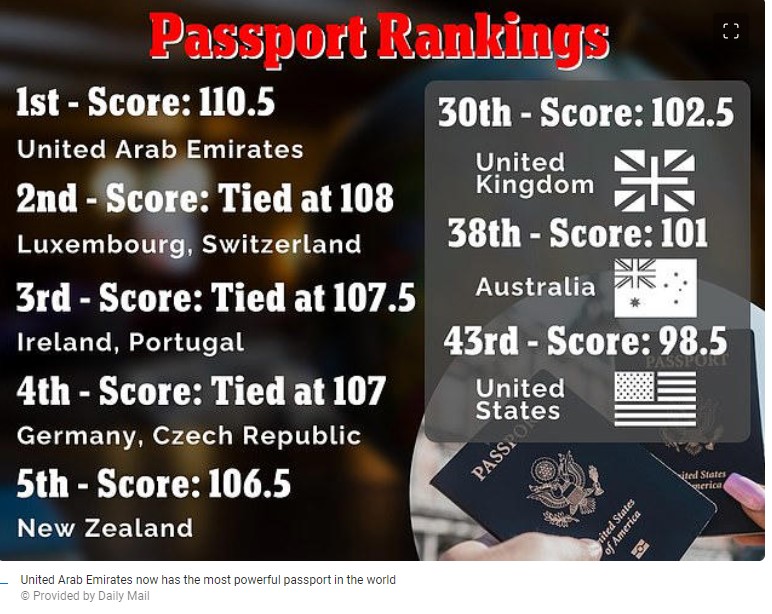United Arab Emirates now has the most powerful passport in the world

The United Arab Emirates now has the most powerful passport in the world, according to a new study.
Nomad Capitalist, a tax and immigration consultancy firm, ranked the value of nearly 200 countries’ passports based on five factors: the availability of visa-free travel, the taxation on residents living in foreign countries, perception, the availability of dual citizenship and personal freedom.
It found that the UAE’s new visa-free travel privileges, as well as its rapidly growing economy and the fact that there are no income taxes have made its passports the most valuable.
Meanwhile, the United States came in at 43rd in large part because it taxes citizens who live in foreign countries. The United Kingdom also ranked 30th and Australia ranked 39.
Previous studies have ranked both the UK and the US higher, but those only took into account how many countries a passport holder can enter without a prior visa.

In Nomad Capitalists’ analysis, the most weight was put on the availability of visa-free travel but it also put emphasis on how much citizens are taxed, the perception of the country, the availability of dual citizenship and personal freedoms that residents enjoy.
It assigned the lowest scores to counties that tax citizens no matter where they live — like the United States, and gave countries that allow citizens to relocate to avoid taxes scores of 20 to 30, countries that do not tax foreign incomes scores of 40 and countries with zero taxes scores of 50.
Those that strictly forbid dual citizenship, like China, received scores of 10, while those that allow for naturalization received a score of 50.
Nomad Capitalist also relied on data from the World Happiness Report and Human Development Index to determine how each country was perceived, but Jovana Vojinovac, the director of operations and sales, said the bottom line is ‘Will someone bother you at the airport as being a citizen of that country?’
And the firm relied on data and news reports on mandatory military service, government surveillance and press freedoms to determine the availability of personal freedoms.
In the end, it found that the United States scored lowest for its taxation policies, and received 30s for both perception and personal freedom.
‘You can theoretically live on the moon if you’re a US citizen and you’ll pay taxes to the US,’ Vojinovac explained to CNBC.
The United Kingdom also scored a 30 for its taxation policy, a 20 for its public perception and 30 for personal freedom; while Australia scored 20 for taxation and 30 for perception.


But the United Arab Emirates came in as the ‘winner of the decade,’ Vojinovac said, because it ‘added 106 new visa-free countries in the last decade’ and is a ‘zero-tax country.’
Its global perception has also improved due to an influx of rich and famous people who moved to the Middle East country.
That is a noticeable change from just a few years ago, Vojinovac said, when her clients would say ‘”I’m not sure how safe it is,” or “We heard some things about their laws,” referring that it is a dominantly Muslim country.’
Others would also confuse the UAE with Saudi Arabia, she said, ‘grouping it all together.’
But slowly people started to realize it has ‘very liberal visa policies and is very welcoming to foreigners, welcome to investments … {it’s] pretty much become a go-to destination for most people that have crypto-based business.’
The UAE also gained 10 points in Nomad’s personal freedom category from the 2022 ranking, due to a series of reforms in the country — though personal freedom remains the UAE’s weakest category.
In 2021, the government announced that Emerati citizenship is attainable for foreigners like investors, doctors, scientists and intellectuals who met a certain bar of requirements.
Still, Vojinovac said, the UAE’s passport is widely-regarded as being one of the most difficult to obtain.
‘As the law is relatively new, we still have to see its practical implications as the number of requests increases.’







